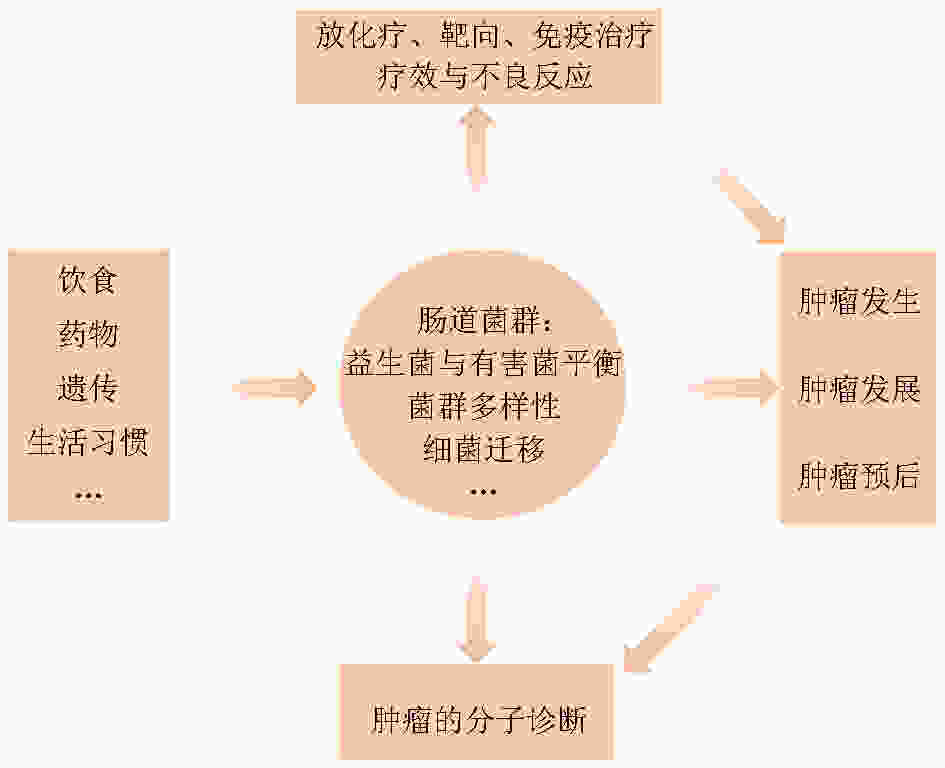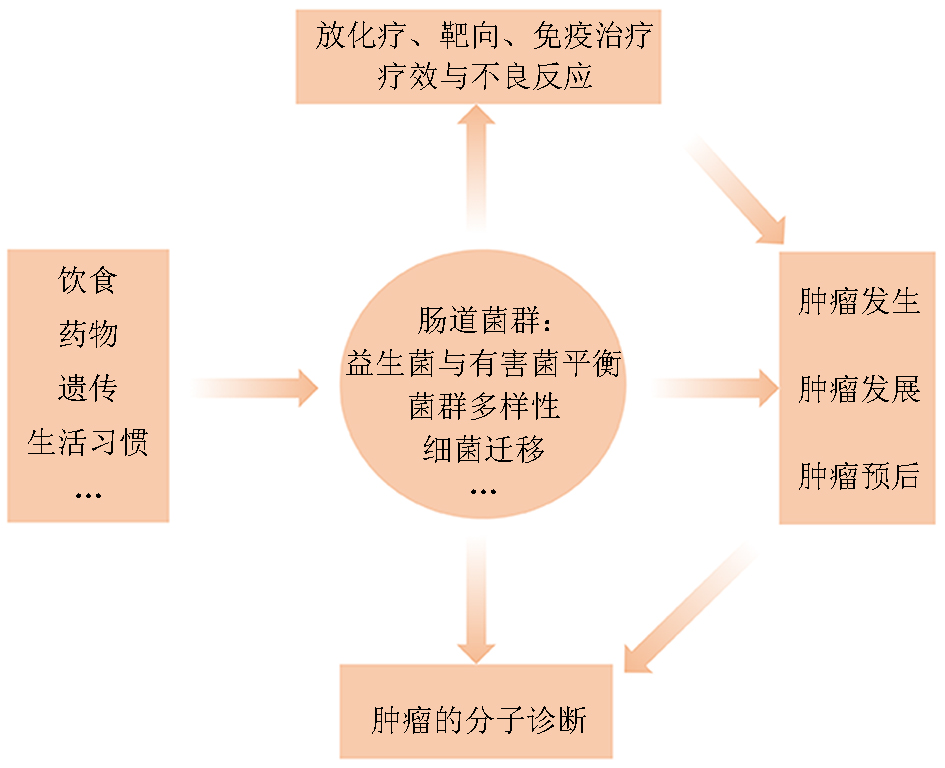|
[1]
|
Sender R, Fuchs S, Milo R. Are we really vastly outnumbered? revisiting the ratio of bacterial to host cells in humans[J]. Cell, 2016, 164(3):337-340. doi: 10.1016/j.cell.2016.01.013
|
|
[2]
|
Lozupone CA, Stombaugh JI, Gordon JI, et al. Diversity, stability and resilience of the human gut microbiota[J]. Nature, 2012, 489(7415):220-230. doi: 10.1038/nature11550
|
|
[3]
|
Conlon MA, Bird AR. The impact of diet and lifestyle on gut microbiota and human health[J]. Nutrients, 2014, 7(1):17-44. doi: 10.3390/nu7010017
|
|
[4]
|
Imhann F, Vich Vila A, Bonder MJ, et al. The influence of proton pump inhibitors and other commonly used medication on the gut microbiota[J]. Gut Microbes, 2017, 8(4):351-358. doi: 10.1080/19490976.2017.1284732
|
|
[5]
|
Marchesi JR, Adams DH, Fava F, et al. The gut microbiota and host health: a new clinical frontier[J]. Gut, 2016, 65(2):330-339. doi: 10.1136/gutjnl-2015-309990
|
|
[6]
|
Thomas S, Izard J, Walsh E, et al. The host microbiome regulates and maintains human health: a primer and perspective for non-microbiologists[J]. Cancer Res, 2017, 77(8):1783-1812. doi: 10.1158/0008-5472.CAN-16-2929
|
|
[7]
|
Fessler J, Matson V, Gajewski TF. Exploring the emerging role of the microbiome in cancer immunotherapy[J]. J Immunother Cancer, 2019, 7(1):108. doi: 10.1186/s40425-019-0574-4
|
|
[8]
|
Scott AJ, Alexander JL, Merrifield CA, et al. International Cancer Microbiome Consortium consensus statement on the role of the human microbiome in carcinogenesis[J]. Gut, 2019, 68(9):1624-1632. doi: 10.1136/gutjnl-2019-318556
|
|
[9]
|
Lazar V, Ditu LM, Pircalabioru GG, et al. Aspects of gut microbiota and immune system interactions in infectious diseases, immunopathology, and cancer[J]. Front Immunol, 2018, 9:1830. doi: 10.3389/fimmu.2018.01830
|
|
[10]
|
Gao ZG, Guo BM, Gao RY, et al. Microbiota disbiosis is associated with colorectal cancer[J]. Front Microbiol, 2015, 6:20.
|
|
[11]
|
Lu YY, Chen J, Zheng JY, et al. Mucosal adherent bacterial dysbiosis in patients with colorectal adenomas[J]. Sci Rep, 2016, 6:26337. doi: 10.1038/srep26337
|
|
[12]
|
Zitvogel L, Galluzzi L, Viaud S, et al. Cancer and the gut microbiota: an unexpected link[J]. Sci Transl Med, 2015, 7(271):271ps1.
|
|
[13]
|
Bullman S, Pedamallu CS, Sicinska E, et al. Analysis of Fusobacterium persistence and antibiotic response in colorectal cancer[J]. Science, 2017, 358(6369):1443-1448. doi: 10.1126/science.aal5240
|
|
[14]
|
Roy S, Trinchieri G. Microbiota: a key orchestrator of cancer therapy[J]. Nat Rev Cancer, 2017, 17(5):271-285. doi: 10.1038/nrc.2017.13
|
|
[15]
|
Flanagan L, Schmid J, Ebert M, et al. Fusobacterium nucleatum associates with stages of colorectal neoplasia development, colorectal cancer and disease outcome[J]. Eur J Clin Microbiol Infect Dis, 2014, 33(8):1381-1390. doi: 10.1007/s10096-014-2081-3
|
|
[16]
|
Hong J, Guo FF, Lu SY, et al. F. nucleatum targets lncRNA ENO1-IT1 to promote glycolysis and oncogenesis in colorectal cancer[J]. Gut, 2021, 70(11):2123-2137. doi: 10.1136/gutjnl-2020-322780
|
|
[17]
|
Dong X, Pan P, Zheng DW, et al. Bioinorganic hybrid bacteriophage for modulation of intestinal microbiota to remodel tumor-immune microenvironment against colorectal cancer[J]. Sci Adv, 2020, 6(20):eaba1590. doi: 10.1126/sciadv.aba1590
|
|
[18]
|
Xia XX, Wu WKK, Wong SH, et al. Bacteria pathogens drive host colonic epithelial cell promoter hypermethylation of tumor suppressor genes in colorectal cancer[J]. Microbiome, 2020, 8(1):108. doi: 10.1186/s40168-020-00847-4
|
|
[19]
|
Cammarota G, Ianiro G. Gut microbiota and cancer patients: A broad-ranging relationship[J]. Mayo Clin Proc, 2017, 92(11):1605-1607. doi: 10.1016/j.mayocp.2017.09.009
|
|
[20]
|
Coker OO, Wu WKK, Wong SH, et al. Altered gut Archaea composition and interaction with bacteria are associated with colorectal cancer[J]. Gastroenterology, 2020, 159(4):1459-1470. doi: 10.1053/j.gastro.2020.06.042
|
|
[21]
|
Xiao Q, Lu W, Kong XX, et al. Alterations of circulating bacterial DNA in colorectal cancer and adenoma: a proof-of-concept study[J]. Cancer Lett, 2021, 499:201-208. doi: 10.1016/j.canlet.2020.11.030
|
|
[22]
|
Zheng YJ, Fang ZY, Xue Y, et al. Specific gut microbiome signature predicts the early-stage lung cancer[J]. Gut Microbes, 2020, 11(4):1030-1042.
|
|
[23]
|
Zhang S, Kong C, Yang YZ, et al. Human oral microbiome dysbiosis as a novel non-invasive biomarker in detection of colorectal cancer[J]. Theranostics, 2020, 10(25):11595-11606. doi: 10.7150/thno.49515
|
|
[24]
|
Alexander JL, Wilson ID, Teare J, et al. Gut microbiota modulation of chemotherapy efficacy and toxicity[J]. Nat Rev Gastroenterol Hepatol, 2017, 14(6):356-365. doi: 10.1038/nrgastro.2017.20
|
|
[25]
|
Viaud S, Saccheri F, Mignot G, et al. The intestinal microbiota modulates the anticancer immune effects of cyclophosphamide[J]. Science, 2013, 342(6161):971-976. doi: 10.1126/science.1240537
|
|
[26]
|
Daillère R, Vétizou M, Waldschmitt N, et al. Enterococcus hirae and Barnesiella intestinihominis facilitate cyclophosphamide-induced therapeutic immunomodulatory effects[J]. Immunity, 2016, 45(4):931-943.
|
|
[27]
|
Yu T, Guo FF, Yu YN, et al. Fusobacterium nucleatum promotes chemoresistance to colorectal cancer by modulating autophagy[J]. Cell, 2017, 170(3):548-563. doi: 10.1016/j.cell.2017.07.008
|
|
[28]
|
Wardill HR, Gibson RJ, van Sebille YZ, et al. Irinotecan-induced gastrointestinal dysfunction and pain are mediated by common TLR4-dependent mechanisms[J]. Mol Cancer Ther, 2016, 15(6):1376-1386.
|
|
[29]
|
Nakayama H, Kinouchi T, Kataoka K, et al. Intestinal anaerobic bacteria hydrolyse sorivudine, producing the high blood concentration of 5-(E)-(2-bromovinyl)uracil that increases the level and toxicity of 5-fluorouracil[J]. Pharmacogenetics, 1997, 7(1):35-43. doi: 10.1097/00008571-199702000-00005
|
|
[30]
|
Fijlstra M, Ferdous M, Koning AM, et al. Substantial decreases in the number and diversity of microbiota during chemotherapy-induced gastrointestinal mucositis in a rat model[J]. Support Care Cancer, 2015, 23(6):1513-1522. doi: 10.1007/s00520-014-2487-6
|
|
[31]
|
Gerassy-Vainberg S, Blatt A, Danin-Poleg Y, et al. Radiation induces proinflammatory dysbiosis: transmission of inflammatory susceptibility by host cytokine induction[J]. Gut, 2018, 67(1):97-107. doi: 10.1136/gutjnl-2017-313789
|
|
[32]
|
Cui M, Xiao HW, Li Y, et al. Faecal microbiota transplantation protects against radiation-induced toxicity[J]. EMBO Mol Med, 2017, 9(4):448-461. doi: 10.15252/emmm.201606932
|
|
[33]
|
Luo XX, Yang C, Zhan GF, et al. Whole brain radiotherapy induces cognitive dysfunction in mice: key role of gut microbiota[J]. Psychopharmacology (Berl), 2020, 237(7):2089-2101. doi: 10.1007/s00213-020-05520-0
|
|
[34]
|
Yi YX, Shen LJ, Shi W, et al. Gut microbiome components predict response to neoadjuvant chemoradiotherapy in patients with locally advanced rectal cancer: a prospective, longitudinal study[J]. Clin Cancer Res, 2021, 27(5):1329-1340. doi: 10.1158/1078-0432.CCR-20-3445
|
|
[35]
|
Mager LF, Burkhard R, Pett N, et al. Microbiome-derived inosine modulates response to checkpoint inhibitor immunotherapy[J]. Science, 2020, 369(6510):1481-1489. doi: 10.1126/science.abc3421
|
|
[36]
|
Tomita Y, Ikeda T, Sakata S, et al. Association of probiotic Clostridium butyricum therapy with survival and response to immune checkpoint blockade in patients with lung cancer[J]. Cancer Immunol Res, 2020, 8(10):1236-1242. doi: 10.1158/2326-6066.CIR-20-0051
|
|
[37]
|
Chalabi M, Cardona A, Nagarkar DR, et al. Efficacy of chemotherapy and atezolizumab in patients with non-small-cell lung cancer receiving antibiotics and proton pump inhibitors: pooled post hoc analyses of the OAK and POPLAR trials[J]. Ann Oncol, 2020, 31(4):525-531. doi: 10.1016/j.annonc.2020.01.006
|
|
[38]
|
Hopkins AM, Kichenadasse G, Karapetis CS, et al. Concomitant proton pump inhibitor use and survival in urothelial carcinoma treated with atezolizumab[J]. Clin Cancer Res, 2020, 26(20):5487-5493.
|
|
[39]
|
Jin YP, Dong H, Xia LL, et al. The diversity of gut microbiome is associated with favorable responses to anti-programmed death 1 immunotherapy in Chinese patients with NSCLC[J]. J Thorac Oncol, 2019, 14(8):1378-1389. doi: 10.1016/j.jtho.2019.04.007
|
|
[40]
|
Peng Z, Cheng SY, Kou Y, et al. The gut microbiome is associated with clinical response to anti-PD-1/PD-L1 immunotherapy in gastrointestinal cancer[J]. Cancer Immunol Res, 2020, 8(10):1251-1261.
|
|
[41]
|
Baruch EN, Youngster I, Ben-Betzalel G, et al. Fecal microbiota transplant promotes response in immunotherapy-refractory melanoma patients[J]. Science, 2021, 371(6529):602-609.
|
|
[42]
|
Routy B, le Chatelier E, Derosa L, et al. Gut microbiome influences efficacy of PD-1-based immunotherapy against epithelial tumors[J].Science, 2018, 359(6371):91-97.
|
|
[43]
|
Gopalakrishnan V, Spencer CN, Nezi L, et al. Gut microbiome modulates response to anti-PD-1 immunotherapy in melanoma patients[J]. Science, 2018, 359(6371):97-103. doi: 10.1126/science.aan4236
|
|
[44]
|
Ji XL, Hou CY, Gao YG, et al. Metagenomic analysis of gut microbiota modulatory effects of jujube (Ziziphus jujuba Mill. ) polysaccharides in a colorectal cancer mouse model[J]. Food Funct, 2020, 11(1):163-173. doi: 10.1039/C9FO02171J
|
|
[45]
|
Zheng DW, Li RQ, An JX, et al. Prebiotics-encapsulated probiotic spores regulate gut microbiota and suppress colon cancer[J]. Adv Mater, 2020, 32(45):e2004529. doi: 10.1002/adma.202004529
|




 下载:
下载:


